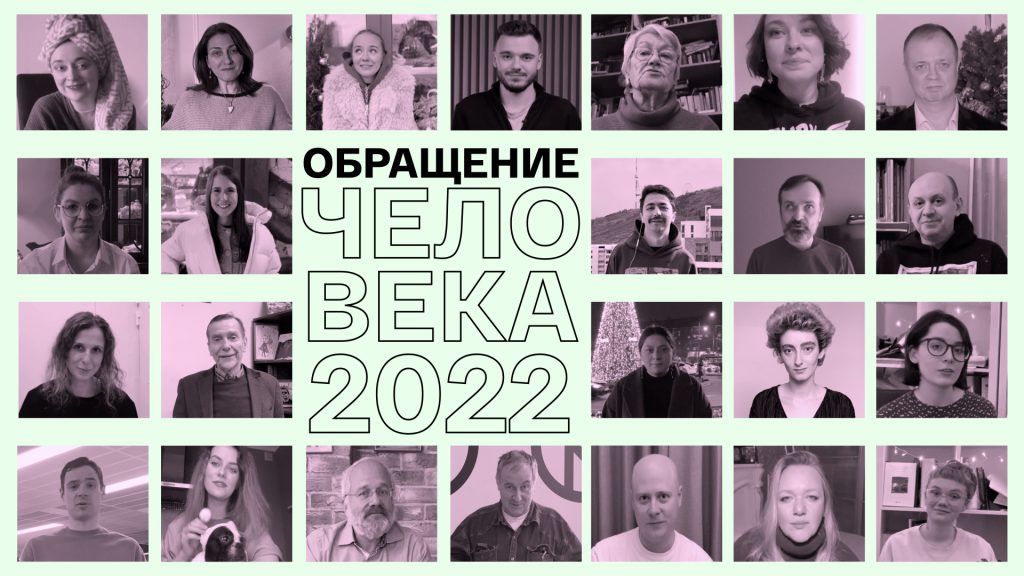“Hello, you are a foreign agent”

Can you turn being labelled a “foreign agent” into something positive? Russian human rights defenders and journalists have joined together, making the lemons handed by the government into lemonade. Recently, using the format of a traditional Russian New Year’s Address, they united to show that they intend to keep on fighting.
“This year, my cats were even more wonderful than last year. They inspire me. May each one has someone who inspires them,” says Aleksander Cherkasov, chairman of the recently liquidated organization Memorial Human Rights Centre, smiling at the camera.
It has been a long – first Soviet, and later Russian – tradition to televise a New Year’s address of the country’s leader to the nation, timing the end of the speech with the first strike of the clock at midnight on December 31. But as the repressions against dissent in Russia drastically increase, alternative New Year’s addresses have started to emerge.
In the video, “The New Year’s Address of a Human,” Aleksander Cherkasov joined 23 other people – journalists and activists – whose 2021 had been marked by persecution and harassment from the Russian authorities. Nevertheless, they do not look sad or despaired, they smile and joke, determined to convey simple truths that resonate with many in Russia today: it’s hard, but keep fighting, hug your loved ones, stay strong, and stay together.
Using the “foreign agent” label as a weapon
“The New Year’s Address of a Human” was produced by two Russian journalists, Sonya Groysman and Olga Churakova. They both worked at the investigative outlet Proekt up until July 2021, when the outlet was labelled “undesirable” by the Russian authorities and was forced to shut down. According to the Russian law, working at an “unwanted” organization can lead to criminal charges and result in up to four years of imprisonment. In addition to that, Sonya and Olga were each individually labeled “foreign agents,” a discriminatory status that makes the journalistic profession close to impossible. But instead of giving up, they fought back, using their new “foreign agent” status as a weapon.
“Does one have to identify one’s “foreign agent” status on Tinder?”
Groysman and Churakova created a successful podcast “Hello, you are a foreign agent,” narrating personal stories of how their and other journalists’ lives changed after they were named “foreign agents.” By mixing personal stories (how does one’s boyfriend or grandmother react to having a loved one named “foreign agent”? does one have to identify her “foreign agent” status on Tinder?) with discussions of journalism and politics, they found a balance between tragic and absurd. The podcast became a captivating narrative that has been documenting, in real-time, the consequences of the Russian repressive legislation. It also created a community, uniting the newly named “foreign agents” with each other and with their supporters across Russia. The New Year’s message became the final accord of the podcast’s first season.
“This year has obviously been a year of “foreign agents” and repressions,” – said Sonya Groysman to Civil Rights Defenders in a phone interview. – “We wanted to create something that could support all of us. But the video also had a utilitarian purpose, because there was no desire whatsoever to watch Putin on the New Year’s Eve.”
“We wanted to create something that could support all of us. But the video also had a utilitarian purpose, because there was no desire whatsoever to watch Putin on the New Year’s Eve.”
In “The New Year’s Address of a Human” each of the 24 speakers continues each other’s sentence or thought, but at the same time, each person presents his or her own take on the year that has stayed behind and the year to come.
What unites them all is their optimism and sense of humor, often dark. “We thought that this [2021] year would be bad, but it was even worse,” says in the video veteran Russian activist Lev Ponomaryov. “It means we have become stronger, but how much stronger [is it possible to become]?,” rhetorically asks Idrak Mirzalizade, a popular in Russia Belarusian stand-up comedian of Azerbaijani origin. Russian court found Mirzalizade guilty of “inciting ethnic hatred” for his jokes about ethnic Russians; the comedian was sentenced to 10 days in jail and permanent expulsion from Russia.
Supporting each other
The core of the “Address,” despite its lightness and humor, is serious. Even the decision to participate in the video was not an easy one for everyone.
“We understood that any public actions, statements and so on create certain risks – such as being individually labeled as a “foreign agent,” told Civil Rights Defenders Elena Lipatova, a lawyer from OVD-Info, an independent and human rights project named a “foreign agent” in 2021. “But in the end, we agreed. Because we thought that not participating would be an act of self-censorship. And that this fear is something that the lawmakers were aiming for when creating the foreign agents legislation.”
“We thought that not participating would be an act of self-censorship. And that this fear is something that the lawmakers were aiming for when creating the foreign agents legislation”.
At the time of publication, the “Address” has been viewed over 61,000 times on YouTube. It proves, once again, that Russian independent journalists, activists, and human rights defenders are not alone in their work and struggle, and that they will continue their uphill battle, difficulties and repressions notwithstanding.
“The secret is simple: we understand that our work helps many people in Russia, and that’s a huge motivation,” says Lipatova. “Sometimes it is hard. Then we meet with our colleagues and support each other. Each person would have her own recipe, but I think that one way or another it is related to spending time with our loved ones. And that’s what our “Address” is about: finding friendship.”


